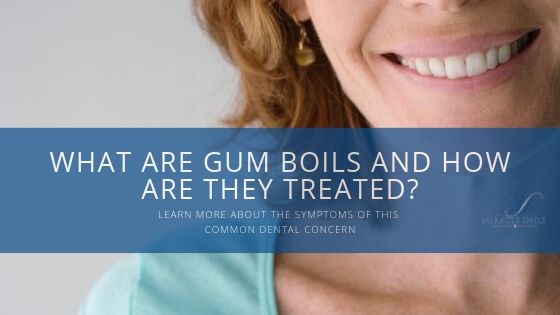There are many ways in which plaque, food, and bacteria in your mouth can lead to an infection, or gum boils. Because of this, good oral hygiene and regular trips to your dentist are crucial. Sometimes, though, problems like this are unavoidable. The best thing to do when you notice something abnormal in your mouth is to schedule an appointment with your dentist to prevent any further problems from developing.
One of the most common issues is gum boils. These are common in people who have gum disease and people who have recently had dental surgery. A gum boil is a pus-filled, swollen bump, or bumps, on the gums. These boils may be painful and are the result of a buildup of bacteria that causes an infection.
This occurs when plaque or food builds up in the gums pockets and causes a bacterial infection. There are two types of gum boils periodontal abscess and periapical abscess.
A periodontal abscess is due to bacterial infection within the gum tissue. A periapical abscess occurs in cases of tooth decay or trauma that leads to an infection in the tooth which spreads to the gums. This type is found much closer to the tooth and is likely close to the root, as well. This type of abscess could require a root canal, so it’s important to see a dentist right away if you believe that you may have one.
The typical symptoms of a gum boil may include:
- bad breath
- nausea
- pain, swelling, and tenderness in the mouth
- a fever
- bleeding or discharge from the boil or gums
- an earache
The most important thing to do when you discover a gum boil is to see your dentist. Gum boils pose risk factors that include a dangerous spreading of the infection. This can lead to something as simple as the loss of a tooth or even death if the infection spreads to the bloodstream.
Just like with any infection in the body, it’s crucial that you seek help to stop the infection from spreading. Any pain, discomfort, or abnormal bumps or growths in your mouth should always be a cause for concern.
If you go to your dentist early on, gum boils are not a big deal. In fact, you’ll likely receive medication to help treat the infection and it will clear up within a few days. After the medication, there are simple home remedies that will help further reduce the swelling and the discomfort that you experience.
For the most part, gum boils are nothing to worry about if you proactively seek help when you find one. The best way to prevent gum boils is to brush your teeth, use mouthwash, floss, and regularly visit your dentists for cleanings and checkups.
If you’re concerned about a gum boil, or anything else, feel free to call our office and schedule a consultation. We will help treat your gum boil and answer any questions that you may have. Call our office today or book an appointment online via our website.

